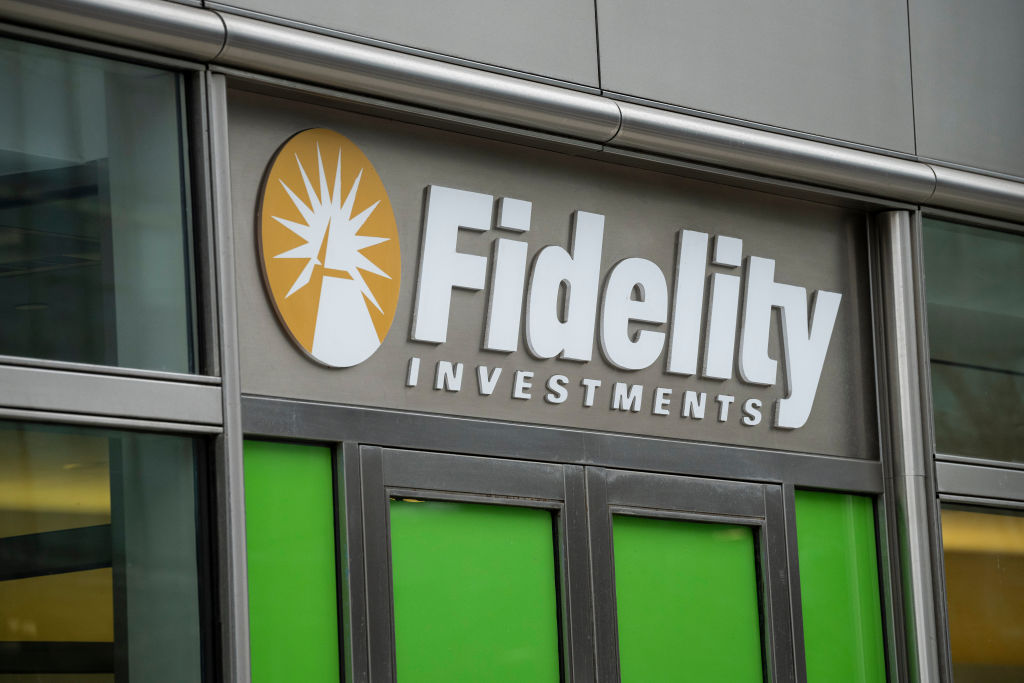5 Best Fidelity ETFs to Buy Now
The best Fidelity ETFs from the leading money manager include a little something for everyone.


Profit and prosper with the best of Kiplinger's advice on investing, taxes, retirement, personal finance and much more. Delivered daily. Enter your email in the box and click Sign Me Up.
You are now subscribed
Your newsletter sign-up was successful
Want to add more newsletters?

Delivered daily
Kiplinger Today
Profit and prosper with the best of Kiplinger's advice on investing, taxes, retirement, personal finance and much more delivered daily. Smart money moves start here.

Sent five days a week
Kiplinger A Step Ahead
Get practical help to make better financial decisions in your everyday life, from spending to savings on top deals.

Delivered daily
Kiplinger Closing Bell
Get today's biggest financial and investing headlines delivered to your inbox every day the U.S. stock market is open.

Sent twice a week
Kiplinger Adviser Intel
Financial pros across the country share best practices and fresh tactics to preserve and grow your wealth.

Delivered weekly
Kiplinger Tax Tips
Trim your federal and state tax bills with practical tax-planning and tax-cutting strategies.

Sent twice a week
Kiplinger Retirement Tips
Your twice-a-week guide to planning and enjoying a financially secure and richly rewarding retirement

Sent bimonthly.
Kiplinger Adviser Angle
Insights for advisers, wealth managers and other financial professionals.

Sent twice a week
Kiplinger Investing Weekly
Your twice-a-week roundup of promising stocks, funds, companies and industries you should consider, ones you should avoid, and why.

Sent weekly for six weeks
Kiplinger Invest for Retirement
Your step-by-step six-part series on how to invest for retirement, from devising a successful strategy to exactly which investments to choose.
Fidelity is best known for its tactical approach to investing, placing a priority on adjusting to market dynamics. And while a few of the best Fidelity ETFs give you cheap, passive exposure to broad-market benchmarks such as the Nasdaq Composite, the majority of offerings provide alternatives to typical index funds.
That's where Fidelity shines. It employs "smart beta" approaches and skilled investment managers who conduct in-depth research on sectors or investment themes to identify the best investments currently performing well.
Whether you're looking for plain passive exchange-traded funds or aggressive options designed for quick returns, the following list of five of the best Fidelity ETFs likely has something for you and your investing goals.
From just $107.88 $24.99 for Kiplinger Personal Finance
Become a smarter, better informed investor. Subscribe from just $107.88 $24.99, plus get up to 4 Special Issues

Sign up for Kiplinger’s Free Newsletters
Profit and prosper with the best of expert advice on investing, taxes, retirement, personal finance and more - straight to your e-mail.
Profit and prosper with the best of expert advice - straight to your e-mail.
To find the top Fidelity ETFs to buy, we focused on funds with assets under management of at least $4 billion, indicating they are well-established. We also included funds from several asset classes with low expense ratios.
Data is as of October 7.
Fidelity Wise Origin Bitcoin Fund

- Assets under management: $25.2 billion
- Expenses: 0.25%, or $25 annually for every $10,000 invested
The Fidelity Wise Origin Bitcoin Fund (FBTC) is one of Fidelity's newest ETF offerings, launched in January 2024.
FBTC is nevertheless one of the most popular options under the firm's umbrella. That's thanks to steady interest in crypto markets and bitcoin, in particular, which is the key underlying asset of this Fidelity ETF.
With 100% of assets invested in bitcoin, FBTC provides a simple and effective way to get exposure to the most popular cryptocurrency.
And with bitcoin having nearly doubled in the last 12 months and up 32% for the year to date, that makes this one of the best Fidelity ETFs to consider for those looking to broaden their exposure beyond typical blue chip stocks.
Learn more about FBTC at the Fidelity provider site.
Fidelity Total Bond ETF

- Assets under management: $21.4 billion
- Expenses: 0.36%
The Fidelity Total Bond ETF (FBND) is another very popular and well-established Fidelity fund due it its lower risk profile.
FBND is an actively managed bond ETF that holds some 4,500 different debt securities and yields 4.5% at present. This is nearly four times the yield of the S&P 500 Index.
The Fidelity ETF holds it all, from rock-solid bonds issued by the U.S. Treasury to a smattering of higher-risk but higher-return "junk bonds" from subpar companies.
About a third of FBND's assets are in government bonds to provide a firm foundation, but another third of the portfolio is allocated to corporate bonds, some of which are loans to distressed companies that offer super-sized yields.
All in all, it is a diversified Fidelity fund that truly gives you exposure to the entire bond market.
Learn more about FBND at the Fidelity provider site.
Fidelity MSCI Information Technology Index ETF

- Assets under management: $16.4 billion
- Expenses: 0.084%
The Fidelity MSCI Information Technology Index ETF (FTEC) is a passively managed sector fund that includes roughly 280 tech stocks.
That allows investors to look deep into the high-growth sector and gain exposure to a variety of companies, from trillion-dollar tech companies to smaller software firms.
FTEC is weighted by market value, so almost 60% of its assets are in the top 10 stocks alone – a lineup that includes tech giants Nvidia (NVDA), Apple (AAPL) and Microsoft (MSFT).
But that could be a feature, not a bug, for those who consider these leaders a strong foundation for this tech ETF to smooth out the volatility that smaller technology names might experience along the way.
Learn more about FTEC at the Fidelity provider site.
Fidelity High Dividend ETF

- Assets under management: $7.2 billion
- Expenses: 0.16%
If you're interested in yield but would prefer dividend stocks to bonds, the Fidelity High Dividend ETF (FDVV) might be worth a closer look.
This fund holds a focused list of 120 or so stocks, but it's one of the best Fidelity ETFs because of its selectivity.
Specifically, FDVV zeroes in on the very best dividend-paying stocks based on consistency of distributions, a strong history of payouts and expectations that they'll continue to grow those dividends going forward.
Top holdings at present include tech giant Microsoft, mega-bank JPMorgan Chase (JPM) and tobacco icon Philip Morris International (PM) – a who's who list of reliable dividend payers.
Learn more about FDVV at the Fidelity provider site.
Fidelity Enhanced Large Cap Core ETF

- Assets under management: $5.4 billion
- Expenses: 0.18%
As its name implies, the Fidelity Enhanced Large Cap Core ETF (FELC) focuses on core large-cap holdings such as Apple, Berkshire Hathaway (BRK.B) and Meta Platforms (META).
The fund is more selective than your typical S&P 500 ETF, however, with about 210 holdings.
The large-cap stocks are selected based on multifactor statistical models that prioritize fundamental characteristics such as profit and sales growth, as well as valuation metrics.
As is typical of Fidelity, there's no way to know the "secret sauce" for certain. However, for those looking to branch out from vanilla index funds, this is one of the best Fidelity ETFs to consider.
Learn more about FELC at the Fidelity provider site.
Related content
Profit and prosper with the best of Kiplinger's advice on investing, taxes, retirement, personal finance and much more. Delivered daily. Enter your email in the box and click Sign Me Up.

Jeff Reeves writes about equity markets and exchange-traded funds for Kiplinger. A veteran journalist with extensive capital markets experience, Jeff has written about Wall Street and investing since 2008. His work has appeared in numerous respected finance outlets, including CNBC, the Fox Business Network, the Wall Street Journal digital network, USA Today and CNN Money.
-
 Quiz: Do You Know How to Avoid the "Medigap Trap?"
Quiz: Do You Know How to Avoid the "Medigap Trap?"Quiz Test your basic knowledge of the "Medigap Trap" in our quick quiz.
-
 5 Top Tax-Efficient Mutual Funds for Smarter Investing
5 Top Tax-Efficient Mutual Funds for Smarter InvestingMutual funds are many things, but "tax-friendly" usually isn't one of them. These are the exceptions.
-
 AI Sparks Existential Crisis for Software Stocks
AI Sparks Existential Crisis for Software StocksThe Kiplinger Letter Fears that SaaS subscription software could be rendered obsolete by artificial intelligence make investors jittery.
-
 5 Top Tax-Efficient Mutual Funds for Smarter Investing
5 Top Tax-Efficient Mutual Funds for Smarter InvestingMutual funds are many things, but "tax-friendly" usually isn't one of them. These are the exceptions.
-
 Why Invest In Mutual Funds When ETFs Exist?
Why Invest In Mutual Funds When ETFs Exist?Exchange-traded funds are cheaper, more tax-efficient and more flexible. But don't put mutual funds out to pasture quite yet.
-
 Social Security Break-Even Math Is Helpful, But Don't Let It Dictate When You'll File
Social Security Break-Even Math Is Helpful, But Don't Let It Dictate When You'll FileYour Social Security break-even age tells you how long you'd need to live for delaying to pay off, but shouldn't be the sole basis for deciding when to claim.
-
 I'm an Opportunity Zone Pro: This Is How to Deliver Roth-Like Tax-Free Growth (Without Contribution Limits)
I'm an Opportunity Zone Pro: This Is How to Deliver Roth-Like Tax-Free Growth (Without Contribution Limits)Investors who combine Roth IRAs, the gold standard of tax-free savings, with qualified opportunity funds could enjoy decades of tax-free growth.
-
 One of the Most Powerful Wealth-Building Moves a Woman Can Make: A Midcareer Pivot
One of the Most Powerful Wealth-Building Moves a Woman Can Make: A Midcareer PivotIf it feels like you can't sustain what you're doing for the next 20 years, it's time for an honest look at what's draining you and what energizes you.
-
 Stocks Make More Big Up and Down Moves: Stock Market Today
Stocks Make More Big Up and Down Moves: Stock Market TodayThe impact of revolutionary technology has replaced world-changing trade policy as the major variable for markets, with mixed results for sectors and stocks.
-
 I'm a Wealth Adviser Obsessed With Mahjong: Here Are 8 Ways It Can Teach Us How to Manage Our Money
I'm a Wealth Adviser Obsessed With Mahjong: Here Are 8 Ways It Can Teach Us How to Manage Our MoneyThis increasingly popular Chinese game can teach us not only how to help manage our money but also how important it is to connect with other people.
-
 Looking for a Financial Book That Won't Put Your Young Adult to Sleep? This One Makes 'Cents'
Looking for a Financial Book That Won't Put Your Young Adult to Sleep? This One Makes 'Cents'"Wealth Your Way" by Cosmo DeStefano offers a highly accessible guide for young adults and their parents on building wealth through simple, consistent habits.